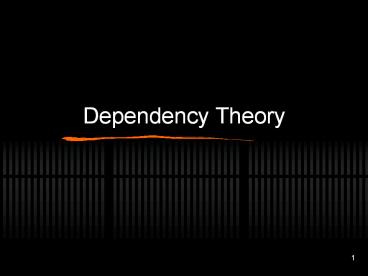Dependency Theory - PowerPoint PPT Presentation
Title:
Dependency Theory
Description:
The relation of interdependence between two or more ... Metropolis-Satellite Structure. State and local level application. Time-dimension of dependency ' ... – PowerPoint PPT presentation
Number of Views:2504
Avg rating:3.0/5.0
Title: Dependency Theory
1
Dependency Theory
2
- Dependence - a situation in which the economy of
certain countries is conditioned by the
development and expansion of another economy to
which the former is subjected. The relation of
interdependence between two or more economies,
and between these and world trade, assumes the
form of dependence when some countries (the
dominant ones) can expand and can be
self-sustaining, while other countries (dependent
ones) can do this only as a reflection of that
expansion, which can have either a positive or a
negative effect on their immediate development
(Dos Santos, 1970).
3
Dependency Theory
- Started around the 1950s
- Answer to the Modernization school
- Took hold in the 1960s and 1970s partly because
of the revolutionary atmosphere of the period - Classical Dependence (1950s)
- New Dependency Studies (1970s)
4
http//www.uni-giessen.de/geographie/presse/images
/Slums.jpg
5
Intellectual Heritage of Classical Dependence
- United Nations Economic Commission for Latin
America (UN-ECLA) experience in the 1940s and
1950s - Neo-Marxism
6
Raúl Prebisch and ECLA
- ECLA did not produce the fruits of neoclassical
trade theory - Prebisch criticized the outdated schema of the
international division of labor - Trade process produced declining terms of trade
for the peripheral countries
7
(No Transcript)
8
Neo-Marxism
- Neo-Marxists see imperialism from the
peripheral point of view, focusing on the
indictments of imperialism on Third World
development. This deviates from the conventional
study of imperialism from the centers
perspective - Orthodox Marxism advocates a strategy of 2-stage
revolution A bourgeois revolution then a
socialist revolution. Neo-Marxists feel that the
situation is already ripe for socialist
revolution, and they want it immediately. They
perceive the bourgeoisie as the creation and tool
of imperialism, incapable of fulfilling its role
as the liberator of the forces of production - If socialist revolution occurs, orthodox Marxists
would like it to be promoted by the industrial
proletariat in the cities, while neo-Marxists are
attracted to the path of socialist revolution
taken by China and Cuba (Foster-Carter)
9
Marxism vs Neo-Marxism
- Essentially a critique of Marxs ideas
- Whereas Marx described capitalist propagation as
a progressive rather than a regressive
movement, neo-Marxists relied almost solely on
the negative and exploitative aspects of the
system
10
- Marx describes the British double-mission in
India as first destructive, then regenerating
the annihilation of old Asiatic society, and
laying the material foundations of Western
society in Asia (Marx 1853). - Marx and Engels expounded that The bourgeoisie,
by the rapid improvement of all instruments of
production, by the immensely facilitated means of
communication, draws all, even the most
barbarian, nations into civilization (Marx and
Engels)
11
- Unlike the neo-Marxists, Marx approved of the
expansion of capitalism without discriminating
between benevolent or destructive practices,
since the end result would be the same the
materialization and eventual realization of the
socialist world order (Polychroniou 1991, 38).
12
Paul Baran
- Born 1910 in Russia, died 1964
- Taught at Stanford - only tenured Marxist
professor during McCarthyism - Father of neo-Marxism
- Concept of economic surplus
- Views of monopoly capitalism colonial drain
- Natural state of monopoly capitalism ? stagnation
13
Andre Gunder Frank
- Born 1929 in Germany, died 2005
- Economic historian and sociologist
- Ph.D. Economics from Chicago
- patched-up some of the holes of early
neo-Marxist analysis of capitalist trade and
exchange - His analysis is closer to Marxs dual-purpose (of
capitalism)
14
Andre Gunder Frank continued
- Metropolis-Satellite Structure
- State and local level application
- Time-dimension of dependency
- development of underdevelopment
15
Arghiri Emmanuel
- More coherent and consistent methodology
- Theory of unequal exchange (not new)- process
of exploitation through international trade
analysis - Unequal rate of labor costs in international
markets ? exploitation through lower compensation
? low organic composition of capital in poor
countries (Polychroniou)
16
Criticism of neo-Marxist or Classical
Dependency Studies
- Lack of intellectual and scientific rigor
- Political blame
- Too external of an analysis
- Modernists All purpose explanation for
everything that is wrong with third world
countries (So) - Propaganda Rhetoric
- Inability to evolve with the shortcomings and
criticism
17
New Dependency Studies
- Need to respond to the criticisms that Classical
dependence could not answer - Cardoso
- Gold
18
Fernando Henrique Cardoso
- Laid the cornerstone of non-Marxist dependency
theory - Cardosos methodology (So)
- historical-structural
- Inclination to internal analysis
- Open-ended process of dependency
19
Associated Dependent Development
- Cardoso different from the single-track outcome
of stagnation and backwardness - Similar to Marxs dual purpose of capitalism,
without heavy theoretical grounding in surplus
value and capitalist processes of production a
new phase as a result of the rise of MNCs,
immersion of industrial capital, new
international division of labor
20
Thomas Gold
- Like Cardoso, heavy on study of history
- Taiwanese development
- Dynamic development without abandoning basic
assumptions of dependency classical ? dependent
development ? dynamic dependency - Emphasis on internal structures that favored good
economic disposition in the future ? deepening
industrialization
21
Difference between New and Classical Dependency
- real world and historical analysis
- Open-ended outcome
- More optimistic































